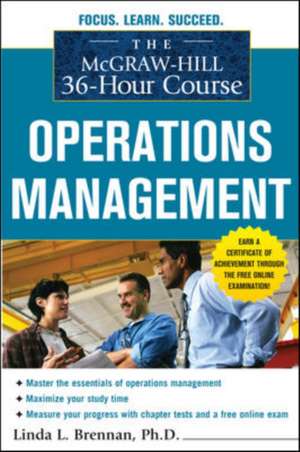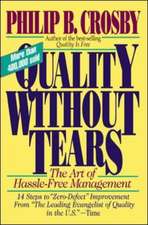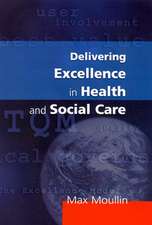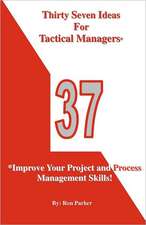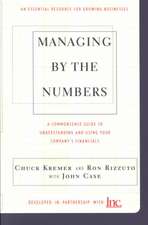The McGraw-Hill 36-Hour Course: Operations Management
Autor Linda Brennanen Limba Engleză Paperback – 16 oct 2010
Take a crash course in boosting operational efficiency!
Whether a business manufactures trucks, delivers packages, or sells coffee, it lives and breathes on its operations. Without exception. Ensuring smooth, efficient processes is a challenging task--but the rewards are immense.The McGraw-Hill 36-Hour Course: Operations Management puts you on the fast track to bolstering and managing the effectiveness of your organization’s operations. Complete with exercises, self-tests, and an online final exam, this virtual immersion course in operations management teaches you how to:- Evaluate and measure existing systems’ performance
- Use quality management tools like Six Sigma and Lean Production
- Design new, improved processes
- Define, plan, and control costs of projects
Preț: 114.53 lei
Preț vechi: 125.99 lei
-9% Nou
Puncte Express: 172
Preț estimativ în valută:
21.92€ • 22.80$ • 18.09£
21.92€ • 22.80$ • 18.09£
Carte tipărită la comandă
Livrare economică 17-22 aprilie
Preluare comenzi: 021 569.72.76
Specificații
ISBN-13: 9780071743839
ISBN-10: 0071743839
Pagini: 256
Ilustrații: Illustrations
Dimensiuni: 152 x 226 x 13 mm
Greutate: 0.35 kg
Editura: McGraw Hill Education
Colecția McGraw-Hill
Locul publicării:United States
ISBN-10: 0071743839
Pagini: 256
Ilustrații: Illustrations
Dimensiuni: 152 x 226 x 13 mm
Greutate: 0.35 kg
Editura: McGraw Hill Education
Colecția McGraw-Hill
Locul publicării:United States
Cuprins
PART I. FOUNDATION
Chapter 1
Results over Routine
(Motivation for this Study; Operations as Competitive Advantage, Guiding Principles for Operations, Technique: Identifying Sources of Competitive Advantage)
Chapter 2
Practical Approach
(Systems Thinking,Business Research Framework, Technique: Evaluating Transformation Systems)
Chapter 3
Desired Results
(Bottom-Line Impact, Measurement Theory, Technique: Developing a Balanced Measurement System)
PART II. RESULTS AT THE ORGANIZATIONAL LEVEL
Chapter 4
Organizational Performance
(The Organization as a Value Chain, Product and Service Design, Operational Decision Points, Technique: Using a House of Quality)
Chapter 5
Quality Practices and Continuous Improvement
(Definitions and Origins of Quality Management, Principles and Practices for Quality,Six Sigma Approach, Technique: Performing Problem Determination, Managing for Results,A Practical Approach to Operations Management)
Chapter 6
Technology across the Value Chain
(Product, Process and Information Technologies,Organizational Learning and Knowledge Management,Technique: Applying Maturity Models)
PART III. RESULTS AT THE PROCESS LEVEL
Chapter 7
Process Design
(Defining Processes, Theory of Constraints, Levers for Capacity Management, Technique: Creating Forecasts)
Chapter 8
Process Analysis & Reengineering
(Costs of Quality, Sources of Waste, Reengineering Principles & Pitfalls, Techniques: Developing Flow Charts)
Chapter 9
Process Control
(To Change or Not to Change: Common vs. Assignable Causes,Statistical Process Control and the Beauty of the Normal Distribution, Attributes versus Variables, Chart Mechanics, Process Capability, Implementation Considerations, Technique: Creating and Interpreting Control Charts)
PART IV. ACHIEVING RESULTS
Chapter 10
Project Definition
(Project Success Factors and Career-Ending Moves, Managing Change, Project Initiation, Project Planning, Technique: Developing a Statement of Work)
Chapter 11
Project Control
(Schedule Development, Feasibility Analysis, Communications Management, Project Closings, Technique: Using the Critical Path Method)
Chapter 12
Project Management
(Project Roles and Responsibilities, Ethical and Effective Leadership, Groups versus Teams; Technique: Running Effective Meetings)
Chapter 1
Results over Routine
(Motivation for this Study; Operations as Competitive Advantage, Guiding Principles for Operations, Technique: Identifying Sources of Competitive Advantage)
Chapter 2
Practical Approach
(Systems Thinking,Business Research Framework, Technique: Evaluating Transformation Systems)
Chapter 3
Desired Results
(Bottom-Line Impact, Measurement Theory, Technique: Developing a Balanced Measurement System)
PART II. RESULTS AT THE ORGANIZATIONAL LEVEL
Chapter 4
Organizational Performance
(The Organization as a Value Chain, Product and Service Design, Operational Decision Points, Technique: Using a House of Quality)
Chapter 5
Quality Practices and Continuous Improvement
(Definitions and Origins of Quality Management, Principles and Practices for Quality,Six Sigma Approach, Technique: Performing Problem Determination, Managing for Results,A Practical Approach to Operations Management)
Chapter 6
Technology across the Value Chain
(Product, Process and Information Technologies,Organizational Learning and Knowledge Management,Technique: Applying Maturity Models)
PART III. RESULTS AT THE PROCESS LEVEL
Chapter 7
Process Design
(Defining Processes, Theory of Constraints, Levers for Capacity Management, Technique: Creating Forecasts)
Chapter 8
Process Analysis & Reengineering
(Costs of Quality, Sources of Waste, Reengineering Principles & Pitfalls, Techniques: Developing Flow Charts)
Chapter 9
Process Control
(To Change or Not to Change: Common vs. Assignable Causes,Statistical Process Control and the Beauty of the Normal Distribution, Attributes versus Variables, Chart Mechanics, Process Capability, Implementation Considerations, Technique: Creating and Interpreting Control Charts)
PART IV. ACHIEVING RESULTS
Chapter 10
Project Definition
(Project Success Factors and Career-Ending Moves, Managing Change, Project Initiation, Project Planning, Technique: Developing a Statement of Work)
Chapter 11
Project Control
(Schedule Development, Feasibility Analysis, Communications Management, Project Closings, Technique: Using the Critical Path Method)
Chapter 12
Project Management
(Project Roles and Responsibilities, Ethical and Effective Leadership, Groups versus Teams; Technique: Running Effective Meetings)
